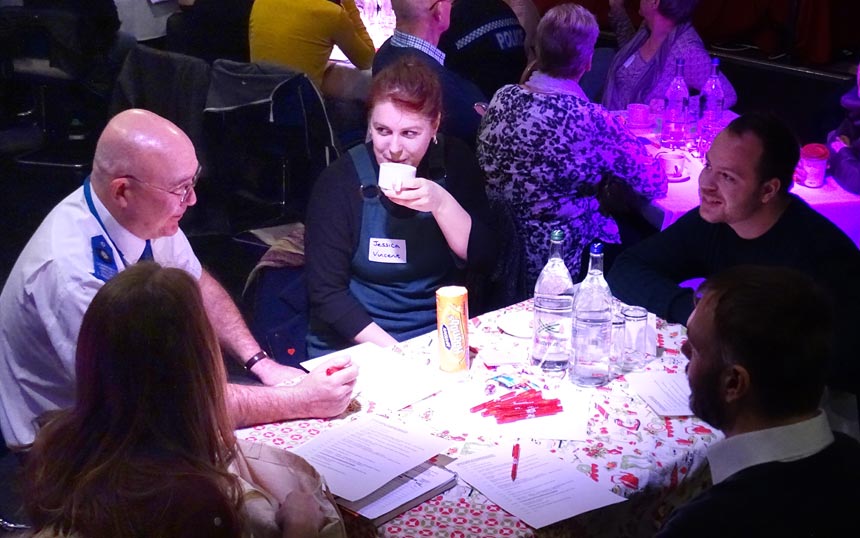Last Thursday we hosted our final Knowledge Sharing Day, a coming together of venues, people living with dementia, and other contributors, celebrating the completion of our Strategic Touring Project.
The STP, supported by Arts Council England, has been a two year project aiming to engage people living with dementia and their carers with the theatre, remove barriers to attendance and participation, and helping to change attitudes to and understanding of people who live with dementia.
The day was attended by a wonderful mix of experts with experience, theatre and health partners, people who have inspired the project, funders (including Arts Council England) and people living with dementia, steered by Orit Azaz, our trusted guide for the day.
We shared stories of opportunities, challenges and achievements. These included innovative projects from The Royal Wolverhampton Hospital, in partnership with The Arena Theatre, which showed how anything can be overcome to take a performance inside an acute hospital ward; the fantastic liaison work between Waterside Theatre, Aylesbury, its District Council and Berkshire Health Authority; to the love that has blossomed between the RSC and Vamos Theatre, the magic that this has created and the lives that it has changed.
We are so proud that so many musical, sensory, social events and groups have been created through the project, which now seem firmly embedded in theatres and care homes, day services and hospitals across the country. As Karen Read from The Seagull Theatre, Suffolk puts it, “Vamos Theatre has created some amazing ripples and they just keep on going.”
Over the last two years, we’ve reached over 13,000 people through the two shows and one workshop intrinsic to the project. It was really impactful for us to hear from the performers who had worked on these: Finding Joy (our show about a woman living with dementia), Sharing Joy (our show made for people living with dementia, which toured to care homes, day centres and theatres) and our workshop, Listening with your Eyes, which teaches the powerful effect of non-verbal techniques, and their benefit in helping us make real and honest connections – particularly with those living with dementia. Working on the shows and workshops has had a profound effect on them as people and enhanced their practice.
We talked about the challenges that exist in making theatres dementia friendly, whether in terms of physical accessibility or in changing attitudes, and discussed and shared ideas and solutions, including hearing from those present who live with dementia about practical ideas for change.
We are also in talks about having arts representation in two ground-shifting groups: the Dementia Friendly Communities Champions Group, chaired by Angela Rippon and a global group, supported by the BBC, of people coming together each month to think about PLWD, including representatives from America, Greece, Italy, Middle East, Canada, China, Japan, Africa, and Australia.
It was clear that everyone taking part believed that great things can be achieved through small changes, and that inclusion brings many rewards for everyone.
We’d like to thank Worcester Arts Workshop for being such excellent hosts of the event: it was a great opportunity for us to try out its newly refurbished creative and performance spaces.
Most importantly, thank you to everyone who has taken part in, and contributed to, the project over the last two years, and to Arts Council England who made it all possible. We’re proud that the impact of the project has been so widespread and that it leaves a legacy of a change in attitudes and awareness in the theatre world and beyond.
Photo: Sue Haslam

